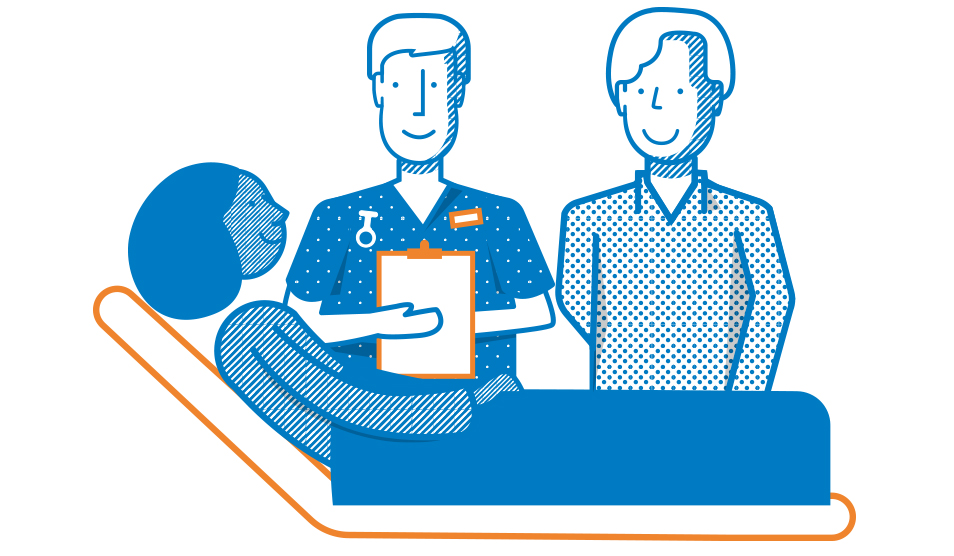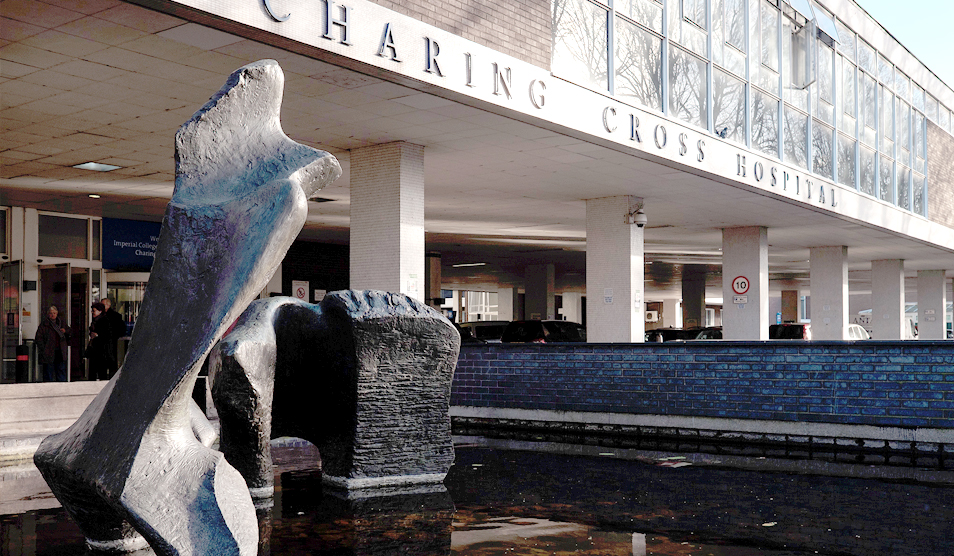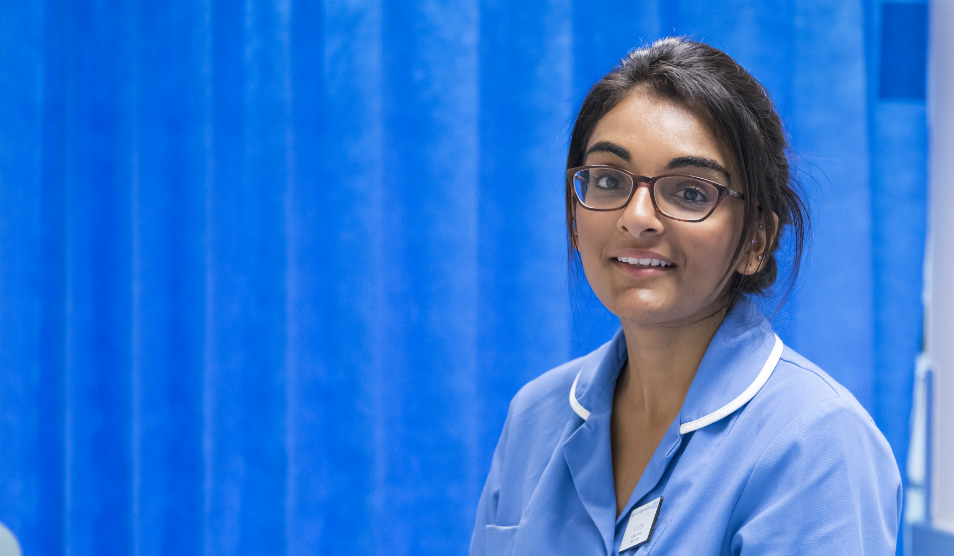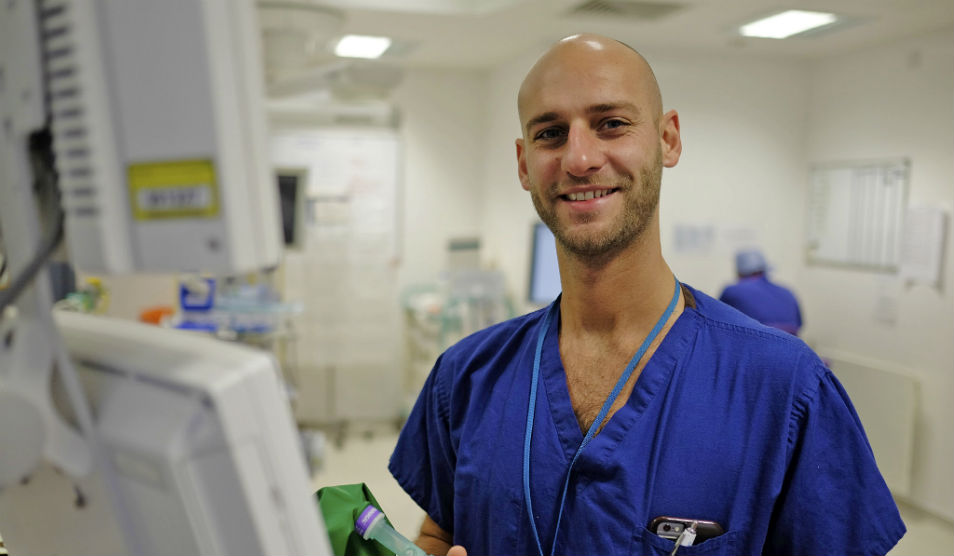Ear, nose and throat
Visitor Information
Translation help:
To translate this page into your preferred language, click the Google Translate icon in the top-right menu and select your desired language.
Our ear nose and throat (ENT) department is amongst the oldest in the world and we are the regional head and neck cancer centre, the regional thyroid cancer centre, the supra-regional skull base surgery centre and the national centre for adult airway reconstruction. Our adult airway service is the largest in Europe.
The department has 13 consultants who, in addition to routine ENT, have sub-specialist skills. Several members of the team are recognised as experts in their field. As a result patients are referred from all over the UK and other countries worldwide.
Otolaryngologists, ear nose and throat (ENT) surgeons, diagnose, evaluate and manage diseases of head and neck and principally the ears, nose and throat as well as structures of the mouth and face, salivary glands and thyroid gland.
- The ears: Otolaryngologists are trained in both the medical and surgical treatment of hearing loss, ear infections, balance disorders, ear noise (tinnitus), and some cranial nerve disorders. Otolaryngologists also manage congenital (birth) disorders of the outer and inner ear.
- The nose: Care of the nasal cavity and sinuses is one of the primary skills of otolaryngologists. Problems in the nasal area include allergies, smell disorders, polyps, and nasal obstruction due to a deviated septum.
- The throat: Communicating (speech and singing) and eating a meal all involve this vital area, otolaryngologists manage diseases of the throat, larynx (voice box), and the upper aero-digestive tract or oesophagus, including voice and swallowing disorders.
- The head and neck: In the head and neck area, otolaryngologists are trained to treat infections, benign (non-cancerous) and malignant (cancerous) tumours, facial trauma, and deformities of the face. They perform both cosmetic plastic and reconstructive surgery.
The principle sub-specialties of ENT surgery are:
- Otology: treatment of infection, disease and damage to the ear to improve hearing and balance. Neurotologists deal with conditions deep in the middle and inner ear where conditions are more closely linked to the brain
- Rhinology: treatment of sinus and nasal disorders, including allergy, to relieve pain, ease breathing and improve nasal function
- Laryngology: treatment of infections of the throat and larynx to ease speech and swallowing
- Head and neck surgery: away from the main ENT systems, specialising in surgery on cysts, glands such as lymph, salivary, thyroid and parathyroid glands and head and neck cancers
- Facial plastic surgery: this can include aesthetic procedures such as rhinoplasty (‘nose job’), pinnaplasty (bat ears), face lifts or reconstructive surgery such as re-setting the jaw. There is a big cross-over here with the work of plastic and oral and maxillofacial surgeons
- Paediatrics: there are many ENT conditions, often congenital, that require treatment at a very young age. These include airway problems, infections of adenoids or tonsils that require their removal and grommets for ‘glue ear’
Conditions and treatments
Our service treats a range of ear nose and throat conditions, including:
|
Nasal congestion/obstruction |
Otitis media and externa
|
Head and neck, thyroid, mouth, skin, skull base, sinisus, salivary gland and laryngeal cancer |
Clinics
Charing Cross Hospital ENT outpatients clinic
Address
First floor
Charing Cross Hospital
Fulham Palace Road
London W6 8RF
Hours
09.00 to 16.15, Monday through Thursday
09.00 to 10.45 Friday
Contact information
Phone: 020 3313 5000, 08.00 to 20.00, Monday through Friday
Email: appointments@imperial.nhs.uk
St Mary’s ENT outpatients clinic
Address
Main outpatients building
First floor
St Mary’s Hospital
Praed Street
London
W2 1NY
Hours
09.00 to 11.00 and 14.00 to 16.00, Monday through Friday
Contact information
Phone: 020 3313 5000, 08.00 to 20.00, Monday through Friday
Our clinics include
- Fracture nose clinic
- Paediatric ENT clinics
- Otology clinic
- Rhinology clinic
- Voice and swallowing clinics
- Urgent diagnostic cancer/neck lump clinic
- Multidisciplinary head and neck clinic
- Dizzy clinic
- Emergency clinics
- Multidisciplinary skull-base surgical service
Meet the team
Consultants
Mr Mark Ferguson, lead clinician
Professor Neil Tolley
Mr Zaid Awad
Mr Elliot Benjamin
Mr Jonathan Bernstein
Mr Peter Clarke
Mr Cameron Davies-Husband
Mr William Grant
Mr Jonny Harcourt
Ms Aphrodite Iacovidou
Miss Romana Kuchai
Mr Alasdair Mace
Mr Abhi Parikh
Miss Catherine Rennie
Mr Matthew Rollin
Professor Hesham Saleh
Professor Guri Sandhu
Mr Ali Taghi
Mr Chadwan Al Yaghchi
Audiological physician
Patient information
Before your appointment
Your outpatient appointment will be within 13 weeks of referral and admission will be within 18 weeks. You are welcome to bring a relative, close friend or carer with you to your appointment.
Remember to check your appointment letter for anything specific you have been asked to take with you. In addition, it would be helpful if you could bring:
- your full address and telephone number(s)
- your appointment card and appointment letter
- your GP’s name and address
- money to pay for any prescriptions (or an exemption card)
- a list of questions you may want to ask your consultant
During your appointment
When you arrive please check-in using our self check-in screens at reception.
During your appointment you will have a consultation with a doctor and you may have a nasendoscopy to assess your voice or swallowing.
A nasendoscopy is a procedure that allows a doctor to see your throat. It is usually done at your outpatient appointment and there is no need to prepare in advance. The doctor passes a small tube, called a nasendoscope, into your nostril and passes it gently backwards until it is sitting just above your voice box. This should not be painful. The tube has a bright light and a tiny camera at the end.
We want to involve you in all the decisions about your care and treatment. We will ask for your permission to go ahead with the nasendoscopy. If there is anything you do not understand or you need more time to think about it, please tell the staff caring for you. Remember, it is your decision. You can change your mind at any time, even if you have already agreed to have the procedure. Let staff know immediately if you change your mind. Your wishes will be respected at all times. Some common questions about a nasendoscopy are answered below.
Why should I have a nasendoscopy?
The nasendoscopy allows your doctor to see the inside of your throat and what happens when you speak and swallow.
What are the risks?
Some people have reported a feeling of light-headedness, nose bleeds, coughing and spasm of the vocal cords. These occur in less than one out of 100 people. Any effects are temporary and should not last more than a minute or two.
Are there any alternatives?
There is no other way for your doctor to gain this level of information.
Will I feel any pain?
The tube may feel a little uncomfortable or tickle, but it should not hurt. Sometimes, if your nose is particularly narrow, the tube may be slightly more uncomfortable. If this is the case, some local anaesthetic spray can be applied around the entrance to your nose. This numbs the area so you do not feel anything.
What happens after the procedure?
There is no recovery period or instructions that you need to follow directly after a nasendoscopy. You may get feedback at the time of the investigation from your doctor.
Other tests that may occur in your appointment with us are microsuction (cleaning the ear canal with suction under a microscope), a skin prick allergy test or a hearing test.
Please note that we are a teaching hospital, so medical students may be present for some appointments. If you do not wish to have them in the room please let the nurse or doctor know and the students will be asked to step outside.
After your appointment
You will either have a follow-up appointment arranged, be discharged or have an admission arranged. Scans or further tests may be needed before your follow-up appointment.
Patient information leaflets:
- Airway injection (steroid)
- Blue laser to voice box
- Botox injections to voice box
- Superior laryngeal nerve block
- Transnasal oesophagoscopy
- Vocal cord injection
Refer to this service
GP
Please use NHS e-Referrals to refer a patient to our ear, nose and throat service.
If you need any advice ahead of making a referral please us via the bleep system at St Mary’s Hospital on 1311, and by phoning 020 3313 5584 nurses station for Charing Cross Hospital.
Two week wait cancer referrals — click here to learn more.
Secondary care
To refer a patient to our service, please contact consultants' secretaries (details below).
Phone: 020 3313 5000, 08.00 to 20.00, Monday through Friday
Email: ICHC-TR.IMPERIALREFERRALS@NHS.NET
Charing Cross Hospital
Secretary to Mr Harcourt and Mr Benjamin
Phone: 020 3311 1069
Email: JOBIGGS@NHS.NET
Secretary to and Mr Grant and Mr Sandhu
Phone: 020 3311 1071
Email:JULIETGEORGE@NHS.NET
Secretary to Mr Clarke and Mr Mace
Phone: 020 3311 7798
Email: HELEN.ANDERSON7@NHS.NET
Secretary to Mr Saleh and Miss Kuchai
Phone: 020 3311 1025
St Mary’s Hospital
Secretary to Mr Tolley and Mr Mace
Phone: 020 3312 7566
Email: LORRAINE.HODGES@NHS.NET
Secretary to Mr Parikh, Miss Kuchai and Mr Patel
Phone: 020 3312 6709
Email: WENDYYOUNG2@NHS.NET
Secretary to Dr Alam Hussein
Phone: 020 3312 1091
Email: PHILLIPA.CRAIG1@NHS.NET
Additional information
ENT emergencies
Patients are advised to go to A&E department if they have an ENT emergency as we have an on call doctor.
Imperial College Healthcare Private Care
We also offer private care services at Imperial College Healthcare.
All funds generated by our private care services are reinvested back into the Trust, supporting the development of both NHS and private care for the benefit of all our patients.
Find more information about private ear, nose and throat treatment on our private care website.
Further online resources
Take our friends and family test Learn more
Would you recommend our services to your friends and family? Let us know by completing our friends and family test. Your comments will help us to make changes and take immediate action when there’s a problem.




